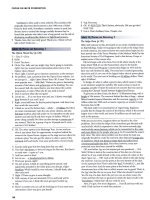92 2018 IELTS FOUNDATION thionline memory UNIT1 minitest2
Bạn đang xem bản rút gọn của tài liệu. Xem và tải ngay bản đầy đủ của tài liệu tại đây (184.64 KB, 2 trang )
Khóa IELTS FOUNDATION
GV: Hồng Hạnh
Facebook: HongHanhIELTSMoon.vn
IELTS FOUNDATION
MEMORY - UNIT 1 - MINI TEST 2
VIDEO và LỜI GIẢI CHI TIẾT chỉ có tại website MOON.VN
[Truy cập tab Tiếng Anh cho Tân sinh viên – Khóa: IELTS FOUNDATION
THE ROLE OF EMOTION IN MEMORY
Does emotion help us remember? That's not an easy question to answer, which is unsurprising when you
consider the complexities of emotion.
First of all, there are two, quite different, elements to this question. The first concerns the emotional
content of the information you want to remember. The second concerns the effect of your emotional state
on your learning and remembering.
The effect of emotional content
It does seem clear that, as a general rule, we remember emotionally charged events better than boring ones.
Latest research suggests that it is the emotions aroused, not the personal significance of the event, that
makes such events easier to remember.
The memory of strongly emotional images and events may be at the expense of other information. Thus,
you may be less likely to remember information if it is followed by something that is strongly emotional.
This effect appears to be stronger for women.
It does seem that memories are treated differently depending on whether they are associated with pleasant
emotions or unpleasant ones, and that this general rule appears to be affected by age and other individual
factors. Specifically, pleasant emotions appear to fade more slowly from our memory than unpleasant
emotions, but among those with mild depression, unpleasant and pleasant emotions tend to fade evenly,
while older adults seem to regulate their emotions better than younger people, and may encode less
information that is negative.
An investigation of autobiographical memories found that positive memories contained more sensorial and
contextual details than neutral or negative memories (which didn't significantly differ from each other in
this regard). This was true regardless of individual's personal coping styles.
Emotionally charged events are remembered better
Pleasant emotions are usually remembered better than unpleasant ones
Positive memories contain more contextual details (which in turn, helps memory)
Strong emotion can impair memory for less emotional events and information experienced at the
same time
It's the emotional arousal, not the importance of the information, that helps memory
Moon.vn - Học để khẳng định mình
1
Hotline: 0432 99 98 98
Khóa IELTS FOUNDATION
GV: Hồng Hạnh
Facebook: HongHanhIELTSMoon.vn
Exercise. Fill in the blanks with no more than THREE words.
1.
2.
3.
4.
5.
6.
7.
We remember (1) ______ better than boring events.
Positive emotions contain more (2) _____ which helps memory.
What helps memory is the (3) _______, not the importance of information.
Pleasant emotions seem to fade (4) ______ from our memory than unpleasant emotions.
It’s not the (5)_____ of the (6)____ that makes events easier to remember.
There are (7)____ different elements to the question “Does emotion help us (8)____?”
You maybe (9) ____ likely to remember info if it is followed by something which is (10) ______.
Giáo viên Hồng Hạnh
Nguồn
Moon.vn - Học để khẳng định mình
2
Moon.vn
Hotline: 0432 99 98 98









